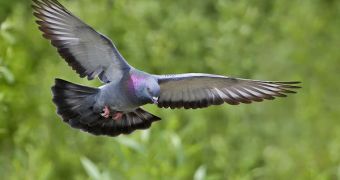According to a new scientific study, pigeons are perfectly able to protect themselves from harm, and to alert others around them of impending doom as well, by producing a sharp, whistling sound with their wings. While they may not look like too intelligent animals, they have sufficient instinct to keep their groups as safe as possible under the given conditions. The whistling sound that gives the alarm mostly occurs when the bird is scared into flight, the BBC News reports.
The way this sound is produced is through special, “modified wings,” which only have effect when a bird is startled into taking off. Alerting the others while already in the air may be too late, or too ineffective to work, so evolution has gifted the pigeon with this special wing conformation, which alerts other birds that something is off even before the pigeon that got scared in the first place realizes it. Details of the new investigation appear in the latest issue of the respected scientific journal Royal Society journal Proceedings B.
“We audio recorded the sound of birds flying off from a feeder in routine flight and compared those sounds to those produced when we scared pigeons into take-off with a gliding model hawk,” Australian National University (ANU) Professor Dr. Robert Magrath, who has been the leader of the new studies, says. He has collaborated with ANU colleague Mae Hingee for recording the sounds that the birds made during take-off in a number of lab-controlled conditions. “We found that they only fled to cover after hearing the alarmed whistles. [They] could tell the difference, and acted appropriately in response,” Magrath shares.
“The birds have one very narrow primary flight feather, which we suspect vibrates during flapping flight to produce the whistling,” he adds. “Lots of people have studied sound production by birds' wings, but here the researchers have actually been able to put it into a context, [and] shown that the sound has a communication role,” University of St Andrews animal communication researcher Sue Anne Zollinger, who has not been involved in the new experiments, tells the news outlet.
“We'd like to find out more about the mechanism of sound production, try to work out whether it evolved specifically as an alarm signal, and see if other birds also use wing sounds [as alarm calls],” Magrath concludes.

 14 DAY TRIAL //
14 DAY TRIAL //